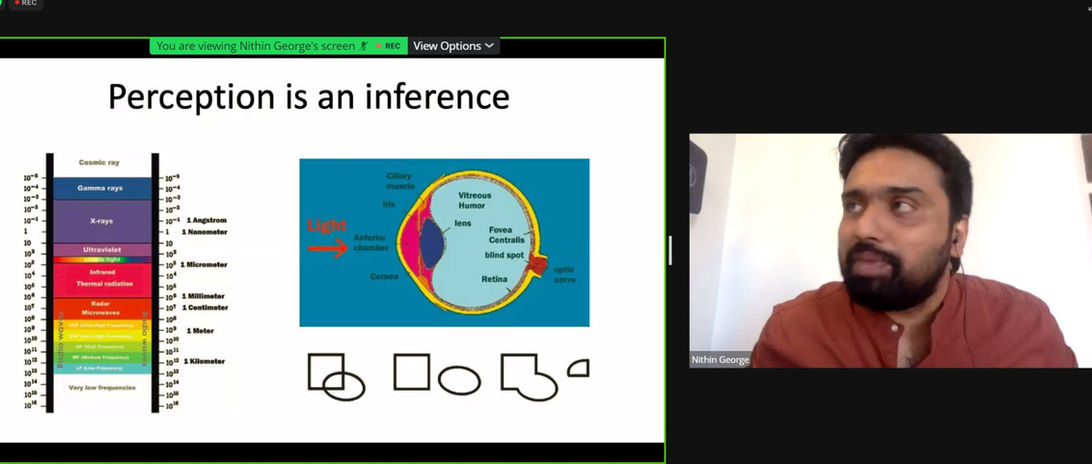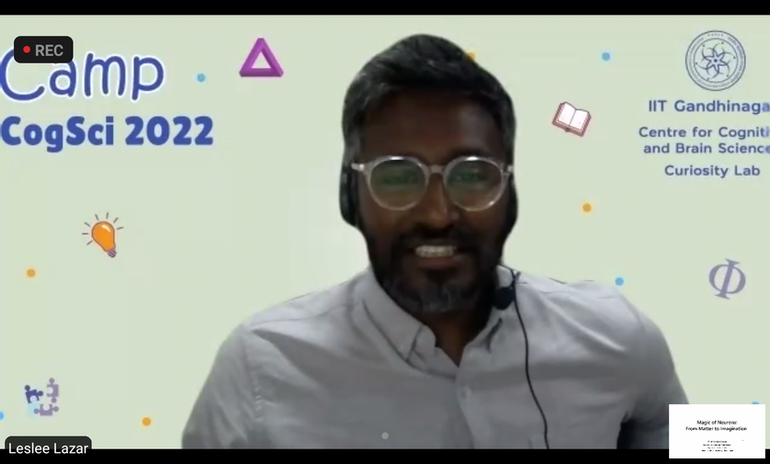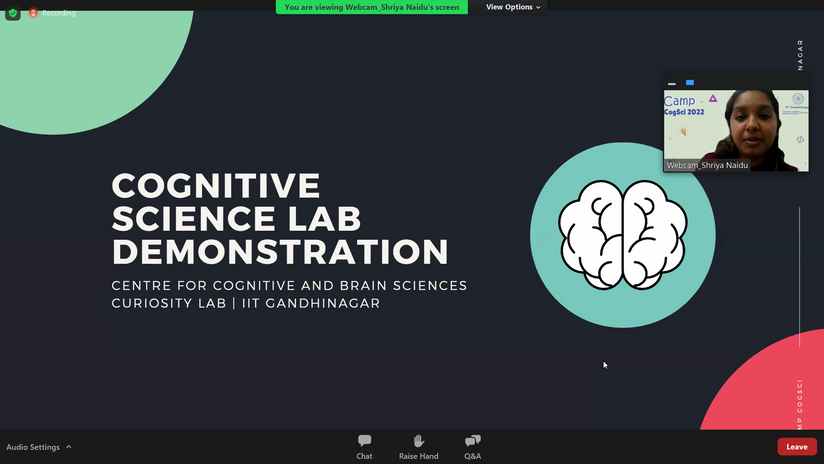Camp CogSci 2022 (online)
Coordinator | Jaison Manjaly | Jasubhai Memorial Chair Professor, IIT Gandhinagar

How did humans become the most advanced species in the world? What happens to our brain when we daydream? Can gaming technology also be used for Autism rehabilitation? Why do we feel happy or sad while listening to music? What potential of the brain can we unlock with simple deep breaths? How do the brain and its many cells govern our behavior? How do skilled dancers make complicated body movements? Will Artificial Intelligence-based teacher robots start taking your classes in a few years?
Cognitive Science explores these questions to understand the most complex organ, the brain, and study the mind through various disciplines such as psychology, computer science, neuroscience, philosophy, linguistics, and anthropology. These disciplines shed light on cognition and cognitive processes such as perception, attention, decision-making, and problem-solving, which help us make sense of the world and interact with it.
Camp CogSci brings you closer to the intriguing workings of cognition, mind, and brain, with activities and sessions that introduce you to the possibilities that lie ahead!
Curiosity Lab invites inquisitive and curious learners, parents, and teachers to develop a deeper understanding of brain mind, consciousness, and behavior for personal and professional growth, making you future-ready, forever.
Highlights of Camp CogSci
Camp Schedule
7 January 2022
04:45 - 05:00 pm: Inauguration
05:00 - 06:30 pm: The musical brain
06:35 - 08:05 pm: Magic of neurons: From matter to imagination
8 January 2022
03:00 - 04:30 pm: Artificial Intelligence: a 20,000 foot view
04:40 - 06:10 pm: Making smart moves: The cognitive control of action
06:20 - 07:50 pm: Teaching cognitive skills: The power of human computer interaction
9 January 2022
09:00 - 10:30 am: Visual illusions
11:00 - 12:30 pm: Why you shouldn't take your 'mind' for granted
04:00 - 05:30 pm: Take a deep breath- Benefits of deep breathing exercises on brain
05:40 - 7:10 pm: Cognitive science lab demonstration
Who should participate?
Camp CogSci is open to students
(8 - 12 grade) with an insatiable curiosity and all interested parents and teachers
Registration
Camp CogSci will be held online from
7 - 9 January 2022. The deadline for registration is January 4, 2022
Contact
Email: camp@iitgn.ac.in
Curiosity Lab, IIT Gandhinagar
Palaj, Gandhinagar – 382355, Gujarat
Camp Modules & Speakers
Take a Deep Breath- Benefits of Deep Breathing Exercises on Brain
The human brain is one of the most fascinating things in this entire universe. Everything that we do in our day-to-day life is controlled by the brain and the nervous system. Our brain mediates a multitude of cognitive functions that help us interact with the world around us- learning, forming memories, attention, decision making, problem-solving, emotional regulation, and so on. And all of us thrive to be exceptionally better when such cognitive abilities are tested. So is there anything that we can do to improve these brain functions? Yes! One simple technique is performing deep breathing! Join us in an interactive session to learn more about how deep breathing influences our brain.

Dr. Goldy Yadav | Post-Doctoral Researcher, Université Catholique Louvain, Belgium
Goldy Yadav completed her PhD (2015-2020) in Cognitive Science at the Indian Institute of Technology, Gandhinagar, where she investigated the underlying mechanisms mediating learning, retention and generalization of newly learned skilled movements, and the interactions between spatial working memory and motor skill memory. She was a Fulbright-Nehru visiting doctoral fellow at the National Institutes of Health where she developed projects exploring the role of sensorimotor neural oscillatory activity on motor output.
AI is everywhere these days from televisions to selfies to washing machines. In this talk, I will introduce what makes AI useful and dangerous. I will specifically give some real world examples of use and misuse of AI. I will conclude by discussing the ethical considerations while designing an AI solution.

Dr. Nipun Batra | Assistant Professor, IIT Gandhinagar
Nipun Batra is an Assistant Professor in Computer Science at IIT Gandhinagar. He previously completed his postdoc from University of Virginia. He completed his PhD. from IIIT Delhi where he was a TCS PhD fellow. His group broadly works on machine learning/AI/sensors/IoT for computational sustainability problems like smart buildings and air quality. His work has been awarded several awards, including, the best PhD presentation at ACM Sensys, best demo at ACM Buildsys, and a best video nominee at ACM KDD.
Making Smart Moves: The Cognitive Control of Action
Charles Sherrington, the Nobel-prize winning neurophysiologist, remarked that "to move things is all that mankind can do....whether it is whispering a syllable or felling a forest". In other words, movement is the only way of influencing the world around us. This seminar will bring out the incredible complexity yet stunning beauty of the neural systems that enable us to perform actions - from seemingly simple ones such as picking up a bottle of water to more intricate ones in dance and other performing arts.

Dr. Pratik Mutha | Jibaben Patel Chair Associate Professor, IIT Gandhinagar
Pratik Mutha is a Jibaben Patel Chair and Associate Professor at the Center for Cognitive and Brain Sciences at IIT Gandhinagar. He completed his PhD from Pennsylvania State University, USA and is the recipient of the Ramanujan Fellowship. His research interests lie in investigating Motor Control and Rehabilitation, focusing on the underlying principles and brain mechanisms that mediate the control of our actions, and to decipher how this control breaks down in case of damage to the brain.
Teaching Cognitive Skills: The Power of Human-Computer Interaction
Cognitive scientists understand how an individual is feeling by monitoring his/her heart rate, skin temperature, looking pattern and twitching of muscles, etc. These techniques can be helpful in teaching social communication skills to children with Autism who have difficulty in expressing their feelings. At IIT Gandhinagar, I work on developing Intelligent Human-Computer Interaction-based training platforms that help in teaching social communication and interaction ability to children with Autism. Through my talk, I will give a glimpse of how we use Intelligent Human-Computer Interaction in our lab to improve the cognitive skills of children with Autism.

Dr. Uttama Lahiri | Professor, IIT Gandhinagar
Uttama Lahiri is a Professor at Electrical Engineering and is associated with the Centre for Cognitive and Brain Sciences at the Indian Institute of Technology Gandhinagar. She has PhD from Vanderbilt University, USA, and MTech from IIT Kharagpur. Her research interests include Virtual Reality based Human-Computer Interaction, Eye Tracking, Adaptive Intelligent techniques in intervention, and rehabilitation-related research.
What is our brain made up of? What makes them so special is that they are responsible for our perception, movements, imagination, and thoughts. This talk will explore the story of neurons, the central protagonists in brains, starting from their discovery, their many shapes, diverse functions, and also a petty fight over which animal has the most number of neurons. Well, does it matter? Is the elephant smarter than humans because they have more neurons? Do dogs have more neurons than cats? This talk will answer many such questions and introduce the beautiful landscape of neurons.
Magic of Neurons: From Matter to Imagination

Dr. Leslee Lazar | Assistant Professor, IIT Gandhinagar
Leslee Lazar is an Assistant Professor at the Centre for Cognitive and Brain Sciences at IIT Gandhinagar. He completed his doctorate from the National Brain Research Centre, Manesar and his postdoctoral fellowship from Harvard Medical School. At the centre, he explores how touch perception interacts with the visual, auditory and proprioceptive senses. He is also the coordinator for the Design and Innovation Centre (DIC) at IIT Gandhinagar.
Music appeals to one and all. Many of you may be trained musicians. Have you ever wondered what are the benefits of listening to music or being trained in music? Have you wondered how we understand music and produce music? We are able to communicate so much via music and many times music without any lyrics can be equally or much more powerful than music with lyrics in sharing our feelings and thoughts. In fact, music and its effect on the human brain is one of recent frontiers of neuroscience and studies on music and the brain has in turn helped neuroscientists to go deeper into the understanding of the functioning of the human brain itself. In my talk, I will give a broad overview on this topic and how studies on the healthy and clinical population have enabled us to come to this conclusion that music engages a wide range of neural networks and engaging in music has far reaching benefits in strengthening our cognitive reserve.
The Musical Brain

Dr. Shantala Hegde | Associate Professor, National Institute of Mental Health and Neuro Sciences
Shantala Hegde is an Associate Professor and Consultant Neuropsychologist at the Department of Clinical Psychology at the National Institute of Mental Health and Neuro Sciences (NIMHANS). She is a Wellcome Trust/DBT India Alliance CPHI Fellow and has been featured by the Wellcome Trust DBT India Alliance Fellow-Spotlight story. She is also a musician (Vocalist) trained in the Hindustani Classical Music tradition and composed and sung for a music CD named ‘Uma Sahasram’. She continues to learn under the tutelage of Smt Bharathi Prathap, a leading musician of the Agra Atrauli Gharana in the country.
Is the world really the way it appears to us? Maybe not. Why does the moon appear larger when it is near the horizon than higher up in the sky? Why does a specific arrangement of dots in an image appear to wobble? Such visual illusions are compelling demonstrations of how the brain constructs our experience of the world. Join the interaction to experience some puzzling optical illusions and ask what causes these illusions. In trying to explain the causes of illusions, we will look at fundamental principles guiding our experience of the world.

Dr. Nithin George | Assistant Professor, Ahmedabad University
Nithin George is an Assistant Professor at Ahmedabad University. He has a PhD from the Indian Institute of Technology Gandhinagar. His research examines how learning of regularities in the environment alter our perceptual experience. Through his research, he aims to describe attention as shaped by everyday exposure to objects in the world.
Why you shouldn't take your mind for granted
Dr. Jaison Manjaly | Jasubhai Memorial Chair Professor, IIT Gandhinagar
What is the Mind? Which entities possess the Mind? Is the Mind a thing? Does the Mind have properties? Can the Mind influence the body? Does a computer have a mind? We all have some of the other answers to these questions. However, a deeper look into these questions could give you an alternative perspective on the general understanding of the Mind. The talk will highlight some of the fundamental challenges we might encounter while making sense of the Mind and how the Mind influences various cognitive functions. We will also discuss the current scientific and technological understanding of the Mind

Jaison Manjaly is Jasubhai Memorial Chair Professor of Philosophy and Cognitive Science at IIT Gandhinagar. His research interests include curiosity, education, and moral cognition. He is the Principal Investigator of the Curiosity Lab at IIT Gandhinagar, which aims to develop interventions to foster curiosity in the classroom. At IIT Gandhinagar, he pioneered the establishment of the Centre for Cognitive and Brain Sciences. He is the former Dean of Student Affairs at IIT Gandhinagar. Currently, he is the Coordinator of Alumni Relations and Head of Humanities and Social Sciences at IIT Gandhinagar.
Cognitive Science Lab demonstrations
Cognitive Science is a fascinating field where researchers explore human behavior, cognitive processes, and evolutionary processes. During this session, we will explore the ways in which cognitive scientists study the brain and behavior. From robots studying body movements to computer-run programs that study behavior, the Centre for Cognitive and Brain Sciences hosts these equipments that allow scientists to explore the human brain, mind and behavior!
Shriya Naidu| Activity Coordinator, Curiosity Camps
.png)
Shriya Naidu is a Junior Project Fellow at IIT Gandhinagar. She closely coordinated Camp HSS in 2021 and has contributed to Camp CogSci 2022. She conducted the Brain Awareness Week in 2020 with the support of the Brain Awareness Week grant by the International Brain
Research Organization and Dana Foundation that introduced students to the area of neuroscience. She was also the convenor for the NeuroNovember Convention and has been part of multiple projects at the Curiosity Lab.
_edited.jpg)
Centre for Cognitive and Brain Sciences @ IIT Gandhinagar
The Centre for Cognitive and Brain Sciences at IIT Gandhinagar was established in 2013 and was the first IIT offering Cognitive Science in India. Through its Ph.D. and MSc programs, the Centre explores questions concerning the mind, brain, and cognition. With a vision to unravel the secrets of the mind, the Centre calls upon bright and curious young minds to be part of its cutting-edge Masters and Ph.D. programs that equip students with a wide range of perspectives and approaches within these areas. The faculty and students at the Centre conduct high-quality research in Curiosity, Attention, Perception, Decision Making, Motor Control, Robotics, and Rehabilitation.
IIT Gandhinagar
IIT Gandhinagar offers a unique educational experience in India with unmatched innovations in curriculum. The institute promotes critical thinking and an appreciation of the interdisciplinary character of knowledge, with an emphasis on the liberal arts, project-oriented learning, diversity, and globalization. IIT Gandhinagar was founded in 2008 and is located in Palaj, Gandhinagar, Gujarat on the banks of river Sabarmati. IITGN is rated India’s first 5-star GRIHA LD (Green) campus for minimizing the negative impact on the environment. The campus has been declared India’s first 5-star campus for ensuring food safety and promoting healthy eating.













